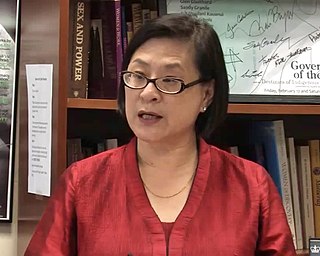Related Research Articles
Citizenship is a membership and allegiance to a sovereign state.

Democracy is a system of government in which state power is vested in the people or the general population of a state. Under a minimalist definition of democracy, rulers are elected through competitive elections while more expansive definitions link democracy to guarantees of civil liberties and human rights in addition to competitive elections.

Immigration to the United States has been a major source of population growth and cultural change throughout much of its history. In absolute numbers, the United States has by far the highest number of immigrants in the world, with 50,661,149 people as of 2019. This represents 19.1% of the 244 million international migrants worldwide, and 14.4% of the United States' population. In 2018, there were almost 90 million immigrants and U.S.-born children of immigrants in the United States, accounting for 28% of the overall U.S. population.
The libertarian perspective on immigration is often regarded as one of the core concepts of libertarian theory and philosophy. There is considerable disagreement among libertarians as to what stance towards immigration best accords with libertarian principles. Some hold that restrictions on immigration are an infringement of the rights of immigrants and other property owners and constitute a threat to individual liberty. Others maintain that open borders amount to a policy of forced integration on the part of the state, and that protecting the rights of property holders requires that present governments adopt much more discriminatory policies on who is allowed to enter a country.

California Proposition 187 was a 1994 ballot initiative to establish a state-run citizenship screening system and prohibit illegal immigrants from using non-emergency health care, public education, and other services in the State of California. Voters passed the proposed law at a referendum on November 8, 1994. The law was challenged in a legal suit the day after its passage, and found unconstitutional by a federal district court on November 11. In 1999, Governor Gray Davis halted state appeals of this ruling.

Free migration or open immigration is the position that people should be able to migrate to whatever country they choose with few restrictions.
United States v. Wong Kim Ark, 169 U.S. 649 (1898), was a landmark decision of the U.S. Supreme Court which held that "a child born in the United States, of parents of Chinese descent, who, at the time of his birth, are subjects of the Emperor of China, but have a permanent domicile and residence in the United States, and are there carrying on business, and are not employed in any diplomatic or official capacity under the Emperor of China", automatically became a U.S. citizen at birth. This decision established an important precedent in its interpretation of the Citizenship Clause of the Fourteenth Amendment to the Constitution.

United States nationality law details the conditions in which a person holds United States nationality. In the United States, nationality is typically obtained through provisions in the U.S. Constitution, various laws, and international agreements. Citizenship is established as a right under the Constitution, not as a privilege, for those born in the United States under its jurisdiction and those who have been "naturalized". While domestic documents often use the words citizenship and nationality interchangeably, nationality is a broader term that refers to national identity and formal membership in a nation, while citizen is reserved to nationals who have the recognized status of citizenship.
In law, an alien is any person who is not a citizen or a national of a specific country, although definitions and terminology differ to some degree depending upon the continent or region. More generally, however, the term "alien" is perceived as synonymous with foreign national.
"Much Apu About Nothing" is the twenty-third episode of the seventh season of the American animated television series The Simpsons. It originally aired on the Fox network in the United States on May 5, 1996. In the episode, a referendum is placed on the ballot that will require all illegal immigrants in Springfield to be deported. After learning that Apu will be deported if the measure passes, Homer helps him prepare for a United States citizenship test so that he can become a legal citizen.

Foreign nationals (aliens) can violate US immigration laws by entering the United States unlawfully or lawfully entering but then remaining after the expiration of their visas, parole, or temporary protected status. Illegal immigration has been a matter of intense debate in the United States since the 1980s.
Civic nationalism, otherwise known as democratic nationalism, is a form of nationalism that adheres to traditional liberal values of freedom, tolerance, equality, and individual rights, and is not based on ethnocentrism. Civic nationalists often defend the value of national identity by saying that individuals need it as a partial shared aspect of their identity in order to lead meaningful, autonomous lives and that democratic polities need a national identity to function properly. Liberal nationalism is used in the same sense as 'civic nationalism', but liberal ethnic nationalism also exists, and "state nationalism" is a branch of civic nationalism, but it can also be illiberal.
Opposition to immigration, also known as anti-immigration, is a political ideology that seeks to restrict the incoming of people from one area to another. In the modern sense, immigration refers to the entry of people from one state or territory into another state or territory in which they are not citizens in contrast, but closely correspond to emigration which refers people leaving one state or territory in which they are citizens. Illegal immigration occurs when people immigrate to a country without having official permission to do so. Opposition to immigration ranges from calls for various immigration reforms, to proposals to completely restrict immigration, to calls for repatriation of existing immigrants.
Illegal immigration is the migration of people into a country in violation of that country's immigration laws, or the continuous residence in a country without the legal right to. Illegal immigration tends to be financially upward, from poorer to richer countries. Illegal residence in another country creates the risk of detention, deportation, and/or other persecutions.
United States citizenship can be acquired by birthright in two situations: by virtue of the person's birth within United States territory or because at least one of their parents was a U.S. citizen at the time of the person's birth. Birthright citizenship contrasts with citizenship acquired in other ways, for example by naturalization.

Mae Ngai is an American historian and Lung Family Professor of Asian American Studies and Professor of History at Columbia University. She focuses on nationalism, citizenship, ethnicity, immigration, and race in 20th-century United States history.

An open border is a border that enables free movement of people between jurisdictions with no restrictions on movement and is lacking substantive border control. A border may be an open border due to intentional legislation allowing free movement of people across the border, or a border may be an open border due to a lack of legal controls, a lack of adequate enforcement or adequate supervision of the border. An example of the former is the Schengen Agreement between most members of the European Economic Area. An example of the latter has been the border between Bangladesh and India, which is becoming controlled. The term "open borders" applies only to the flow of people, not the flow of goods and services, and only to borders between political jurisdictions, not to mere boundaries of privately owned property.

Bhutanese nationality law is the law governing the acquisition, transmission and loss of Bhutanese citizenship. The Bhutanese Citizenship Act of 1985 was introduced by the Druk Gyalpo Jigme Singye Wangchuck, on June 10, 1985, modifying the definition of a Bhutanese citizen. The Act was implemented as part of a new national policy of Driglam Namzha, national customs and etiquette. Because of its emphasis on Bhutanese culture, the Act is also referred to as the "One Nation, One People Act." The 1985 Act was amended by the Immigration Act of 2007 and then superseded in 2008 by the Constitution of Bhutan insofar as previous laws are inconsistent; where not inconsistent, the provisions of the 2007 Act, the 1985 Act, and previous Acts relating to immigration continue in effect.

Citizenship of the United States is a legal status that entails Americans with specific rights, duties, protections, and benefits in the United States. It serves as a foundation of fundamental rights derived from and protected by the Constitution and laws of the United States, such as freedom of expression, due process, the rights to vote, live and work in the United States, and to receive federal assistance.
Jane Junn is an American political scientist. She is the University of Southern California Associates Chair in Social Sciences, and a professor of political science and gender studies. She studies public opinion, political behavior, and survey methodology, including work on the relationship between education and public participation, Asian American political participation, and gender and politics.
References
- ↑ "Elizabeth Cohen | Political Science". www.bu.edu. Retrieved June 5, 2024.
- 1 2 3 4 5 6 "Elizabeth F. Cohen". Syracuse University. Retrieved June 18, 2020.
- ↑ Hamidi, Camille (February 1, 2011). "Review Semi-Citizenship in Democratic Politics". Revue française de science politique. 61 (1): 154–156.
- 1 2 Bolzendahl, Catherine (July 2010). "Review Semi-Citizenship in Democratic Politics". American Journal of Sociology. 116 (1): 301–303. doi:10.1086/655640.
- ↑ Balfour, Lawrie (December 1, 2010). "Review Semi-Citizenship in Democratic Politics". Perspectives on Politics. 8 (4): 1190–1191. doi:10.1017/S1537592710002379. S2CID 145809115.
- 1 2 3 Lazar, Nomi Claire (June 2020). "Review The Political Value of Time: Citizenship, Duration, and Democratic Justice". Perspectives on Politics. 18 (2): 614–615. doi:10.1017/S1537592720000432. S2CID 225828239.
- ↑ "Best Book Award". PS: Political Science & Politics. 52 (4). American Political Science Association: 838–858. 2019. doi:10.1017/S1049096519001550. S2CID 233340619 . Retrieved June 18, 2020.
- ↑ "Review Illegal: America's Lawless Immigration Regime and How it Threatens Us All". Kirkus Reviews. 2020. Retrieved June 18, 2020.
- ↑ Cohen, Elizabeth F. (March 13, 2019). "What Immigration Restrictionists Can't Foresee". The Atlantic. Retrieved May 4, 2021.
- ↑ Cohen, Elizabeth (February 1, 2013). "Should illegal immigrants become citizens? Let's ask the founding fathers". Washington Post. ISSN 0190-8286 . Retrieved May 4, 2021.
- ↑ Cohen, Elizabeth F. (March 1, 2017). "Why Trump's immigration policies will increase undocumented immigration". The Agenda. Archived from the original on March 7, 2017. Retrieved May 4, 2021.
- ↑ Blow, Charles M. (June 22, 2013). "Opinion | Border Surge Meets Bluster Surge". The New York Times. ISSN 0362-4331 . Retrieved May 4, 2021.
- ↑ Levitz, Eric (December 4, 2019). "ICE Didn't Need McKinsey's Help to Abuse Detainees". Intelligencer. Retrieved May 4, 2021.
- ↑ https://aissr.uva.nl/content/events/lectures/2018/12/the-political-value-of-time.html?origin=KUHyM4f8RLeh6D4937fo2A&1573907986531 [ dead link ]